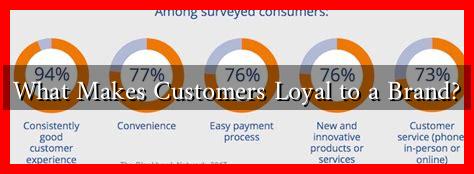-
Table of Contents
- What Makes Customers Loyal to a Brand?
- The Importance of Customer Loyalty
- Key Factors Influencing Customer Loyalty
- 1. Quality of Products and Services
- 2. Exceptional Customer Service
- 3. Emotional Connection
- 4. Consistency Across Channels
- 5. Loyalty Programs
- 6. Social Responsibility
- Case Studies of Successful Brand Loyalty
- Conclusion
What Makes Customers Loyal to a Brand?
In today’s competitive marketplace, customer loyalty is a coveted asset for brands. Loyal customers not only contribute to consistent revenue but also act as brand ambassadors, promoting products through word-of-mouth. But what exactly fosters this loyalty? This article delves into the key factors that make customers loyal to a brand, supported by examples, case studies, and statistics.
The Importance of Customer Loyalty
Customer loyalty is crucial for several reasons:
- Repeat Business: Loyal customers are more likely to make repeat purchases, which can significantly boost a company’s bottom line.
- Cost-Effectiveness: Acquiring new customers can be five to 25 times more expensive than retaining existing ones.
- Brand Advocacy: Loyal customers often share their positive experiences, leading to organic marketing and new customer acquisition.
Key Factors Influencing Customer Loyalty
1. Quality of Products and Services
The foundation of customer loyalty lies in the quality of the products or services offered. Brands that consistently deliver high-quality offerings tend to build trust and reliability among their customers. For instance, Apple has cultivated a loyal customer base by providing innovative and high-quality products that meet consumer needs.
2. Exceptional Customer Service
Customer service plays a pivotal role in shaping customer experiences. Brands that prioritize customer support and resolve issues promptly tend to foster loyalty. A study by Zendesk found that 82% of consumers have stopped doing business with a company due to poor customer service. Companies like Zappos are renowned for their exceptional customer service, which has significantly contributed to their loyal customer base.
3. Emotional Connection
Building an emotional connection with customers can significantly enhance loyalty. Brands that resonate with customers on a personal level often see higher retention rates. For example, Nike’s “Just Do It” campaign inspires and motivates customers, creating a sense of belonging and loyalty to the brand.
4. Consistency Across Channels
In an omnichannel world, consistency is key. Customers expect a seamless experience whether they are shopping online, in-store, or through mobile apps. Brands like Starbucks have successfully integrated their loyalty programs across various platforms, ensuring that customers receive a consistent experience regardless of how they engage with the brand.
5. Loyalty Programs
Loyalty programs are a direct way to reward customers for their repeat business. These programs can take various forms, including points systems, discounts, or exclusive access to products. According to a report by Bain & Company, companies with effective loyalty programs can see a 5-10% increase in revenue. Brands like Sephora have successfully implemented tiered loyalty programs that incentivize customers to engage more with the brand.
6. Social Responsibility
Modern consumers are increasingly concerned about social and environmental issues. Brands that demonstrate a commitment to social responsibility can foster loyalty among customers who share similar values. For instance, Patagonia has built a loyal following by prioritizing sustainability and ethical practices in its business model.
Case Studies of Successful Brand Loyalty
Several brands exemplify the principles of customer loyalty:
- Amazon: With its customer-centric approach, Amazon has created a loyal customer base through convenience, fast shipping, and a vast product selection.
- Coca-Cola: Coca-Cola’s marketing campaigns often evoke nostalgia and happiness, creating an emotional connection that keeps customers coming back.
- Costco: By offering high-quality products at competitive prices and a strong membership model, Costco has cultivated a loyal customer base that values both savings and quality.
Conclusion
Customer loyalty is not an accident; it is the result of strategic efforts by brands to meet and exceed customer expectations. By focusing on product quality, exceptional customer service, emotional connections, consistency, loyalty programs, and social responsibility, brands can cultivate a loyal customer base that drives long-term success. As the marketplace continues to evolve, understanding and implementing these factors will be crucial for brands aiming to thrive in a competitive environment.

